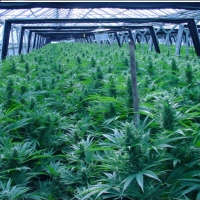California Alliance to Legalize Pot Bails on 2014 and Won’t be Back for Two Years

Indecisive, in no hurry to start work and perhaps a bit confused.
While those attributes might fairly describe the marijuana-smoking slacker stereotype, they may also be ascribed in a less pejorative fashion to advocates of legalizing recreational marijuana who announced Tuesday they are delaying for two years an effort to put an initiative on the 2014 California ballot.
The initiative would have let people 21 and older buy less than an ounce of marijuana and grow up to six plants for personal use. It also would have levied a stiff 25% tax on pot sales. The money would theoretically have been used to mitigate damage done by illegal pot growing and fund education, and drug and alcohol treatment.
The Control, Regulate and Tax Marijuana Act (pdf) was relegated to the back burner by supporters who will stop gathering signatures to qualify despite polls that show, again, that Californians would vote to legalize and regulate the drug if given the chance. Of course, they were given that chance in 2010 when a Survey USA poll showed that 56% of Californians would vote for Proposition 19, but ended up rejecting it decisively.
This year was going to be different, coming on the heels of legalization victories in Colorado and Washington State. But a number of factors convinced the Coalition for Cannabis Reform, which was led by the Drug Policy Alliance, that the time was not right for its initiative.
Alliance Deputy Executive Director Stephen Gutwillig told the Los Angeles Times that waiting until 2016 has a lot of advantages. The population will be younger and their turnout will be higher in a presidential election year; midterm elections have notoriously low turnout and can favor conservatives. Gutwillig also said that, although the signature-gathering campaign is well-funded, time is running short to raise enough money for the general election.
In the interim, there could be a gathering momentum as other states consider their own legalization schemes. A delay in California would also allow the courts and lawmakers at local, state and federal levels to resolve glaring statutory conflicts that have confused and stymied the public.
For instance, while federal law criminalizes possession and sale of pot, California legalized medical marijuana in 1996 and authorized nonprofit cooperatives as dispensaries in 2004. Dispensaries have trouble doing business because federal law prohibits banks from touching their money, and when they do thrive, they are apt to be prosecuted by the feds.
Meanwhile, President Barack Obama and Attorney General Eric Holder both continue to give wildly mixed messages about what the federal government will tolerate from the states. Their pronouncements seem to shift every few months.
Two proposed pot initiatives have already been approved for circulation by the California Secretary of State—the California Cannabis Hemp Initiative of 2014 (pdf) and the Marijuana Control, Legalization and Revenue Act of 2014 (pdf). The former is a very grassy grass roots movement that does not appear to have the resources to get very far.
The latter has not raised much money, but its supporters say now that the 800-pound gorilla has left the field, they can raise the $3 million necessary to acquire enough signatures to get it on the ballot. Campaign finance records indicate they were in the red as of December 31.
–Ken Broder
To Learn More:
Major Marijuana Legalization Measure off the Table for 2014 (by Josh Richman, San Jose Mercury News)
California Ballot Measure on Pot Legalization Delayed until 2016 (by Maria L. La Ganga, Los Angeles Times)
Waiting For California to Legalize Marijuana (by Chris Weigant, Huffington Post)
Familiar Marijuana Legalization Initiative Cleared for Signature Gathering (by Ken Broder, AllGov California)
- Top Stories
- Controversies
- Where is the Money Going?
- California and the Nation
- Appointments and Resignations
- Unusual News
- Latest News
- California Forbids U.S. Immigration Agents from Pretending to be Police
- California Lawmakers Urged to Strip “Self-Dealing” Tax Board of Its Duties
- Big Oil’s Grip on California
- Santa Cruz Police See Homeland Security Betrayal in Use of Gang Roundup as Cover for Immigration Raid
- Oil Companies Face Deadline to Stop Polluting California Groundwater





